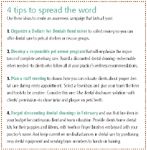Celebrate dental health all year
Twenty-nine days just aren't enough to get all of your clients on board with dental care. So let's promote dental health for pets year-round with a program to raise awareness.
February is fast approaching, and soon the buzz around National Pet Dental Health Month will begin again. I'm grateful for the kick-in-the-pants reminder that February can be a slow month, and we should encourage business growth. But why focus on dental health—a scientifically proven key factor in promoting overall wellness—less than 30 days of the year? Do we encourage any other crucial services one out of 12 months? Of course not.
Let's mix it up a bit
We need to change how we think about pet dental health. I never thought I'd recommend the veterinary profession emulate human medicine, but I must make an exception. Take a look at National Breast Cancer Awareness Month. Every May, the profession unites to deliver an educational campaign promoting breast cancer awareness. The key word: awareness. These groups educate the public and encourage those who haven't had a mammogram to do so. And, unlike the veterinary profession, they charge full price for the procedure they recommend. We could argue it's because of human health insurance, but I've talked to veterinary practice owners and managers who discount dental cleanings in February—even for clients whose insurance covers part or all of the cost of their pet's procedure.
In fact, many veterinary practices set goals and award bonuses based on the success of their February promotion. What message does this send your team members? How can they recommend dental cleanings in December at full price knowing two months later, clients will receive a discount and team members will receive a bonus? And when you recommend a dental cleaning in May, how many clients respond, "If I wait until February, will I receive a discount?" A better solution: Use February as a springboard for a yearlong program that keeps dental care top-of-mind for clients and team members.
How we keep the party going
My team highlights our dental services during every visit. We discuss dental care at the first puppy or kitten visit, during annual physicals, and at senior pet visits. Pet exam report cards in our puppy, kitten, senior, and dental kits reinforce—in written form—our dental recommendations.

4 tips to spread the word
Our doctors examine pets' teeth in the client's presence as part of our routine exam. Exam room assistants teach clients to brush and use alternative dental hygiene methods to keep pets' teeth clean and breath fresh. We tell clients their pet may periodically require dental cleanings as part of its complete heathcare program and to help prevent extensive dental work in the future.
Our practices must educate our team members and clients and provide high-quality dental care for our patients. Our profession must value our services and charge fairly to provide them. Pet dental health care and education should occur daily, not as a once-a-year, month-long promotion forgotten after the trinkets are distributed and the discount ends.
Florence Sanford, CVPM, is a practice manager at Nassau Veterinary Clinic in Nassau, NY. Please send questions or comments to firstline@advanstar.com









